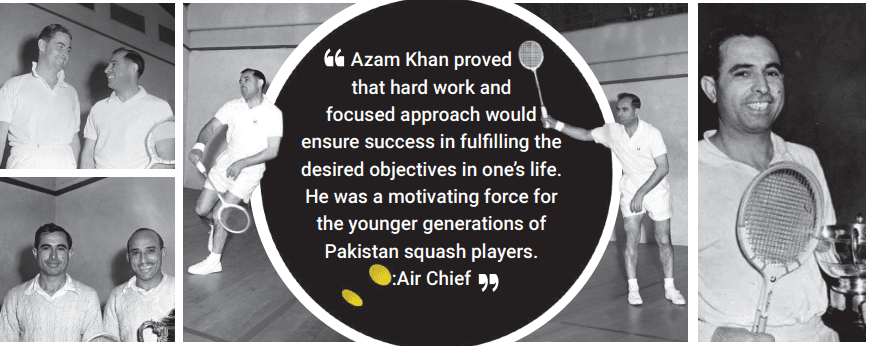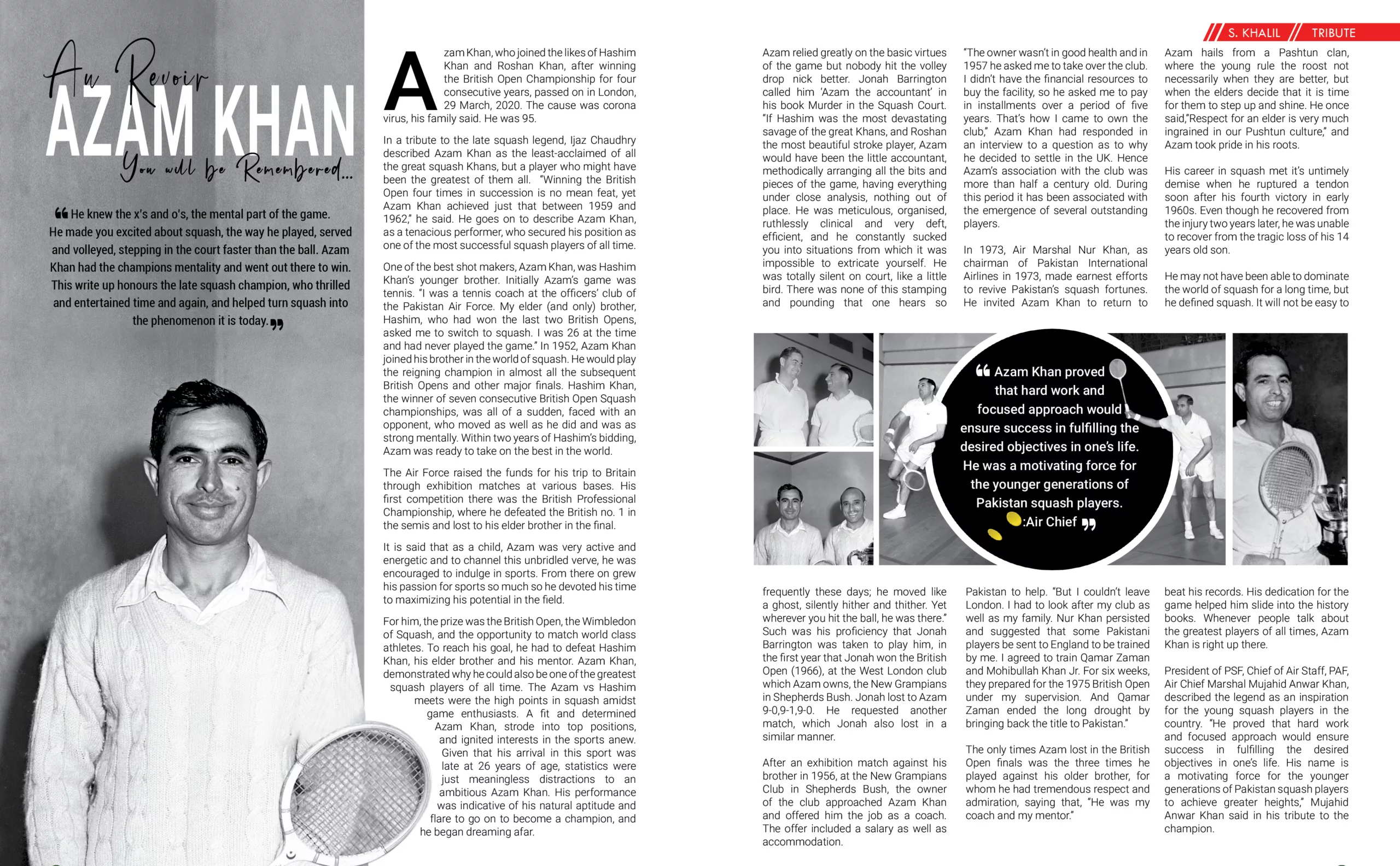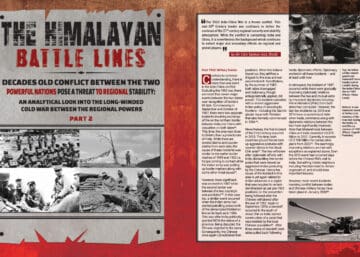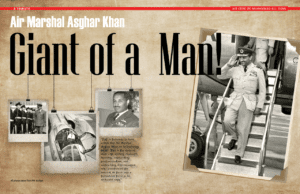Azam Khan, who joined the likes of Hashim Khan and Roshan Khan, after winning the British Open Championship for four consecutive years, passed on in London, 29 March, 2020. The cause was corona virus, his family said. He was 95.
In a tribute to the late squash legend, Ijaz Chaudhry described Azam Khan as the least-acclaimed of all the great squash Khans, but a player who might have been the greatest of them all. “Winning the British Open four times in succession is no mean feat, yet Azam Khan achieved just that between 1959 and 1962,” he said. He goes on to describe Azam Khan, as a tenacious performer, who secured his position as one of the most successful squash players of all time.
One of the best shot makers, Azam Khan, was Hashim Khan’s younger brother. Initially Azam’s game was tennis. “I was a tennis coach at the officers’ club of the Pakistan Air Force. My elder (and only) brother, Hashim, who had won the last two British Opens, asked me to switch to squash. I was 26 at the time and had never played the game.” In 1952, Azam Khan joined his brother in the world of squash. He would play the reigning champion in almost all the subsequent British Opens and other major finals. Hashim Khan, the winner of seven consecutive British Open Squash championships, was all of a sudden, faced with an opponent, who moved as well as he did and was as strong mentally. Within two years of Hashim’s bidding, Azam was ready to take on the best in the world.
The Air Force raised the funds for his trip to Britain through exhibition matches at various bases. His first competition there was the British Professional Championship, where he defeated the British no. 1 in the semis and lost to his elder brother in the final.
It is said that as a child, Azam was very active and energetic and to channel this unbridled verve, he was encouraged to indulge in sports. From there on grew his passion for sports so much so he devoted his time to maximizing his potential in the field.
For him, the prize was the British Open, the Wimbledon of Squash, and the opportunity to match world class athletes. To reach his goal, he had to defeat Hashim Khan, his elder brother and his mentor. Azam Khan, demonstrated why he could also be one of the greatest squash players of all time. The Azam vs Hashim meets were the high points in squash amidst game enthusiasts. A fit and determined Azam Khan, strode into top positions, and ignited interests in the sports anew. Given that his arrival in this sport was late at 26 years of age, statistics were just meaningless distractions to an ambitious Azam Khan. His performance was indicative of his natural aptitude and flare to go on to become a champion, and he began dreaming afar.

Azam relied greatly on the basic virtues of the game but nobody hit the volley drop nick better. Jonah Barrington called him ‘Azam the accountant’ in his book Murder in the Squash Court. “If Hashim was the most devastating savage of the great Khans, and Roshan the most beautiful stroke player, Azam would have been the little accountant, methodically arranging all the bits and pieces of the game, having everything under close analysis, nothing out of place. He was meticulous, organised, ruthlessly clinical and very deft, efficient, and he constantly sucked you into situations from which it was impossible to extricate yourself. He was totally silent on court, like a little bird. There was none of this stamping and pounding that one hears so frequently these days; he moved like a ghost, silently hither and thither. Yet wherever you hit the ball, he was there.” Such was his proficiency that Jonah Barrington was taken to play him, in the first year that Jonah won the British Open (1966), at the West London club which Azam owns, the New Grampians in Shepherds Bush. Jonah lost to Azam 9-0,9-1,9-0. He requested another match, which Jonah also lost in a similar manner.
After an exhibition match against his brother in 1956, at the New Grampians Club in Shepherds Bush, the owner of the club approached Azam Khan and offered him the job as a coach. The offer included a salary as well as accommodation.
“The owner wasn’t in good health and in 1957 he asked me to take over the club. I didn’t have the financial resources to buy the facility, so he asked me to pay in installments over a period of five years. That’s how I came to own the club,” Azam Khan had responded in an interview to a question as to why he decided to settle in the UK. Hence Azam’s association with the club was more than half a century old. During this period it has been associated with the emergence of several outstanding players.
In 1973, Air Marshal Nur Khan, as chairman of Pakistan International Airlines in 1973, made earnest efforts to revive Pakistan’s squash fortunes. He invited Azam Khan to return to Pakistan to help. “But I couldn’t leave London. I had to look after my club as well as my family. Nur Khan persisted and suggested that some Pakistani players be sent to England to be trained by me. I agreed to train Qamar Zaman and Mohibullah Khan Jr. For six weeks, they prepared for the 1975 British Open under my supervision. And Qamar Zaman ended the long drought by bringing back the title to Pakistan.”
The only times Azam lost in the British Open finals was the three times he played against his older brother, for whom he had tremendous respect and admiration, saying that, “He was my coach and my mentor.”
Azam hails from a Pashtun clan, where the young rule the roost not necessarily when they are better, but when the elders decide that it is time for them to step up and shine. He once said,”Respect for an elder is very much ingrained in our Pushtun culture,” and Azam took pride in his roots.
His career in squash met it’s untimely demise when he ruptured a tendon soon after his fourth victory in early 1960s. Even though he recovered from the injury two years later, he was unable to recover from the tragic loss of his 14 years old son.
He may not have been able to dominate the world of squash for a long time, but he defined squash. It will not be easy to beat his records. His dedication for the game helped him slide into the history books. Whenever people talk about the greatest players of all times, Azam Khan is right up there.
President of PSF, Chief of Air Staff, PAF, Air Chief Marshal Mujahid Anwar Khan, described the legend as an inspiration for the young squash players in the country. “He proved that hard work and focused approach would ensure success in fulfilling the desired objectives in one’s life. His name is a motivating force for the younger generations of Pakistan squash players to achieve greater heights,” Mujahid Anwar Khan said in his tribute to the champion.








